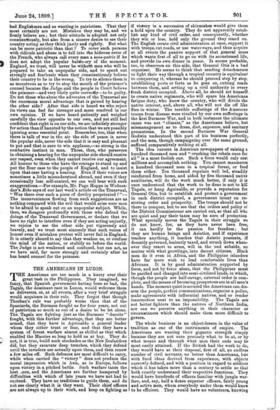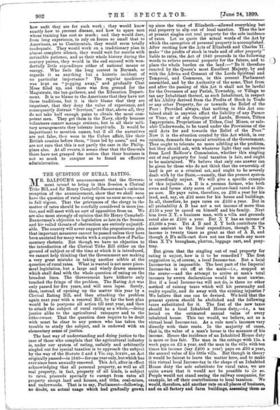THE AMERICANS IN LUZON. T HE Americans are too much in
a hurry over their great task in the Philippines. They imagined, we fancy, that Spanish government having been so bad, the Tagals, the dominant race in Luzon, would welcome them as deliverers, or, at all events, after a very brief struggle would acquiesce in their rule. They forgot that though Theebau's rule was probably worse than that of the Spaniards, the Burmese fought us for four years, not out of patriotism so much as out of a desire to be let alone. The Tagals are fighting just as the Burmese " dacoits" fought, with this further advantage, that they are better armed, that they have in Aguinaldo a general leader whom they either trust or fear, and that they have a system of forest warfare almost as skilful as that which enabled the Maories so long to hold us at bay. They do not, it is true, build such stockades as the New Zealanders did, but they excavate deep trenches, which they defend until the invaders are actually upon them, and then renew a few miles off. Such defences are most difficult to carry, while when carried the " victory " does not produce the moral impression which in Asia, as in Europe, follows upon victory in a pitched battle. Such warfare taxes the best ,,nen, and the Americans are further hampered by difficulties with which of late years we have not had to coitend. They have no traditions to guide them, and do i not see clearly what it is they want. Their chief officers are not always up to their work, and keep on fighting as if viotory in a succession of skirmishes would give them a hold upon the country. They do not apparently estab- lish any kind of civil order, and consequently, whether they win or lose, hold only the ground they stand on. The English create civil administration at once, support it with troops, cut roads, or use waterways, and thus acquire at all events the passive support of that general mass which wants first of all to go on with its accustomed life, and provide its own dinner in peace. It seems probable, too, to observers on this side, that General Otis is a, bad organiser. He seems to think that sending detachments to fight their way through a tropical country is equivalent to conquering it, whereas he should proceed step by step, establishing posts or forts as he goes on, cutting roads between them, and setting up a civil authority in every fresh district occupied. Above all, he should set himself . to create native regiments, who will spare his Americans fatigue duty, who know the country, who will divide the native interest, and, above all, who will not the off like flies in winter. The terrible sufferings of the American troops from disease were rivalled by our own sufferings in the first Burmese War, and in both instances the ultimate cause was not " climate," as the Americans believe, but mismanagement as to dress, diet, exposure, and sanitary precautions. In the second Burmese War General Godwin understood this part of his business perfectly, and the men, though campaigning over the same ground, suffered comparatively nothing at all.
The idea current in American newspapers of raising a hundred thousand men and " crushing the rebels once for all" is a most foolish one. Such a force would only cos: millions and accomplish nothing. You cannot manoeuvre a hundred thousand men in a tropical forest, or feed them either. Ten thousand regulars well led, steadily reinforced from home, and aided by five thousand native auxiliaries, will do the work much better, if only it is once understood that the work to be done is not to kill Tagals, or hang Aguinaldo, or provide a reputation for General Otis, but to establish and protect a government in each district occupied, a government intent on re- storing order and prosperity. The troops should not be there to conquer, but to see that the orders and policy of the District Commissioner are carried out, so that all whc are quiet and pay their taxes may be sure of protection What specially moves the Tagals in their struggle we do not know, for, as they have never been free, it can hardly be the passion for freedom ; but they are human beings and Asiatics, and if experience teaches anything, it teaches that Asiatic peasants, if decently governed, leniently taxed, and struck down when- ever they resort to arms, will in the end subside, nc matter with what growlings, into decent citizens. Black men do it even in Africa, and the Philippine islanders have far more wish to lead comfortable lives than Africans. It is by good administration supported by force, and not by force alone, that the Philippines must be pacified and changed into semi-civilised lands, in which, though the people are half-savage, external order is com- plete, and the means of becoming prosperous are in all men's hands. The moment quiet is secured the Americans can dis- arm the people, perfect communications, organise a police, make agreements with influential natives, and so render insurrection next to an impossibility. The Tagals are not better fighters than the natives of Northern India, nor can we perceive anything in their character or circumstances which should make them more difficult to govern.
The whole business is an object-lesson in the value of tradition as one of the instruments of empire. The Americans are wasting their gigantic strength simply because they are not sure precisely what to be at, or by what means and through what men their ends may be most easily attained. If the British had the work to do, they would have at their disposal, first of all, an endless number of civil servants, no better than Americans, but with fixed ideas derived from experience, with objects narrowly defined, and with a position in regard to soldiers which it has taken more than a century to settle so that both exactly understand their respective functions. They would have hundreds of officers familiar with jungle war. fare, and, say, half a dozen superior officers, fairly young and active men, whom everybody under them would know to be efficient. They would have no volunteers, knowing how unfit they are for such work ; they would know exactly how to prevent disease, and how to spare men whose training has cost so much; and they would dare, from long experience, to rely on forces so small that to Americans, as to Continentals, they would seem totally inadequate. They would work on a traditionary plan in almost complete silence, they would wait for results with invincible patience, and as their whole history during the century proves, they would in the end succeed with won- derfully little expenditure either of national means or energy. Who feels the long contest in Burmah, or regards it as anything but a historic incident of no particular importance ? The regular machinery was kept on " pegging away," and gradually Chat Moss filled up, and there was firm ground for the Magistrate, the tax-gatherer, and the Education Depart- ment. It is no blame to the Americans that they have not these traditions, but it is their blame that they are impatient, that they deny the value of experience, and consequently distrust " Services," and that, above all, they do not take half enough pains to obtain the most com- petent men. They get them in the Navy, chiefly because volunteers cannot manage cruisers, but in all their mili- tary arrangements they tolerate ineptitude. It would be impertinent to mention names, but if all the narratives are not false, they were in the Cuban affair, like their British cousins before them, " lions led by asses," and we are not sure that this is not partly the case in the Philip. pines also. At all events, it seems clear that the Generals there have not grasped the notion that their business is not so much to conquer as to found an effective administration.



















































 Previous page
Previous page